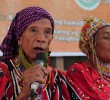By GRACE S. UDDIN | Davao Today
DAVAO CITY�Just how important was the memorandum of agreement on ancestral domain (MOA-AD) to the Moro people?
Mohagher Iqbal, the chief negotiator of the Moro Islamic Liberation Front (MILF), said the document contains the political solution to the age-old problem of the Bangsamoro people.
He said that the Bangsamoro’s age-old problem had something to do with self-governance. The Bangsamoro people, who used to be under the rule of a Sultanate, lost their self- governance when Spain included Mindanao in the sale of the Philippines to the United States in the Treaty of Paris in 1898, despite the fact that Spain never really conquered Mindanao as part of the colony.
How can it sell something that it did not own in the first place? Bangsamoro scholar Abhoud Syed M. Lingga asked in a 2002 paper he presented to a tri-people’s (Lumads, Muslims and Christians) gathering in Davao.
Iqbal always referred to the official granting of Philippine independence by the Americans in 1946 as the beginning of the “annexation” of Mindanao to the Philippines. He said the Moro people were not asked whether they wanted to be included in the Philippines or not.
Lingga said that Bangsamoro leaders did not want to be part of the Philippine republic during the granting of its independence from the United States.
In his paper, “Referendum: A political option for Mindanao,” Lingga said Moro leaders even wanted the islands of Mindanao, Palawan and Sulu cut off from the Philippines in 1924, expressing their desire to be a US colony because they hoped that later on, they will be granted independence as a separate state under the UN declaration on de-colonization.
ACCORDING TO Iqbal, the MOA on ancestral domain would have been a step toward the Bangsamoro people’s right to self- determination because it would have given the Moro Islamic Liberation Front (MILF) the authority over territories covered by the BJE.
“It gives back to our people their lost sovereignty, their right to govern themselves either in the form of state or substate,” he said. “The right to self determination is the collective right of people to determine their political status and to pursue their social, economic development.”
Various United Nations instruments have enshrined the people’s right to self determination, including Article 1 of the International Covenant on Economic, Social and Cultural Rights (ICESCR), and Article 1 of the International Covenant on Civil and Political Rights (ICCPR), which states that all “peoples have the right to self- determination, by virtue of which, they freely determine their political status and freely pursue their economic, social and cultural development.”
Iqbal said that BJE’s powers have yet to be spelled out in the comprehensive compact, which was supposed to be the third and the last agenda in the talks between the government and the MILF.
“Without BJE, which is the framework agreement, the comprehensive compact cannot be crafted,” Iqbal said.
Under the BJE, the MILF had settled for “shared authority” in terms of territory, resources and governance. Iqbal said ‘shared authority’ is different from ‘shared sovereignty,’ which the MILF initially asserted but eventually compromised, because the government construed it to mean “granting independence” to MILF.
“The GRP is afraid to open (granting independence to MILF) because of its many crimes against the Moro people and because of vested interests of political warlords and business oligarchs,” Iqbal said.
BJE also redefines the relationship of the Bangsamoro and the Filipino people, according to Iqbal. After Mindanao was included in the territories that made up the Philippines, he said, the Moro people have become “second class” citizens.
“It is rare for the Moro people to occupy positions in the bureaucracy,” he said. “Who is the President? Who are the senators? Who own big companies in Mindanao? Who heads the military and the police? Who are the big landowners?” he asked.
He explained that the BJE would have redefined such ‘lop-sided’ relationship.
Peace Process









